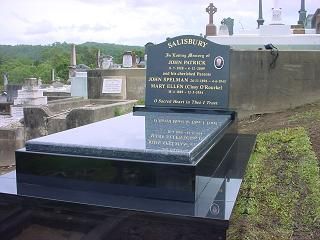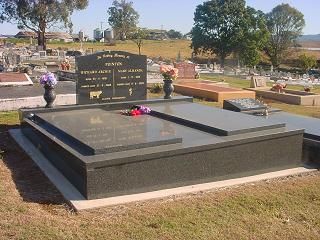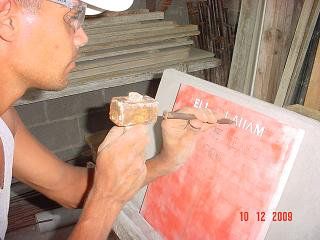What to do when someone dies?
When a loved one passes away, it can be a difficult time for everyone. They are grieving and mourning the loss of someone, and they likely do not want to be thinking about what the next steps are.

That is why we have set out what to do when someone dies, to assist in this sad time and try to make things a little easier to organise. If you would like some further information, please contact MMS Memorials at 07 3265 5433 and we can assist with any queries you may have.
What to do when someone dies - steps to take
The following are the most common steps following a loved one passing away. Each situation is different, however, so ensure you speak to a local memorials specialist who will be able to assist you further.
What should be done straight away?
The actions that should be taken straight away depending on where the death occurred.
Death at home
- If the death was expected, call your doctor who will issue a Doctor's Certificate of Cause of Death.
- If the death was unexpected, call the Police. The circumstances of the death will determine whether a Coroner requires a post-mortem to find the cause of death or not.
Death in hospital
- If the death occurred in a hospital or a nursing home/care facility, speak to the staff. They will arrange a Doctor's Certificate of Cause of Death.
Organ donation
The next step is organ donation, if applicable.
- If the person who has passed away is an organ donor, the next of kin will be required to provide consent for organ donation to proceed.
- If you are unsure as to whether the person who has passed away is an organ donor, the next of kin will be required to decide whether or not to donate the deceased’s organs.
If organ donation is to occur, your loved one will be required to be taken to the hospital as a matter of urgency, so that the donation process can occur.
Check the Australian Organ Donor Register if you are unsure if your loved one has registered as an organ donor.
Prepaid funeral arrangements
It is very important to determine whether your loved one has made any funeral arrangements already, including:
- Prepaid Funeral: Check to see if a funeral has already been prepaid, and if so, contact the applicable funeral director. If you are unsure if anything has been prepaid, check with the solicitor or executor of the deceased's estate - they will usually have a copy.
- Funeral Bond: If the person who has passed away has a funeral bond, this can be used to help towards funeral costs. Note however that a funeral bond can nominate the funeral director which is the preferred choice, so always check before making any arrangements.
- Insurance: Check if any insurance has been taken out, including life, accident, private health, sickness or funeral insurance, and contact the relevant company to see if any payouts apply.
Contact a funeral director
If a funeral has not been prepaid, you will need to contact a funeral director.
- If your loved one has already nominated a preferred funeral director before their passing, contact them to collect the body.
- If a funeral director has not been nominated, you will need to find a suitable one and contact them.
The funeral
There is a range of steps to consider and organise when it comes to the funeral. This includes:
- Location of the funeral.
- Religion (if applicable).
- Burial or cremation.
- Who is going to officiate the funeral?
- What type of memorial will be used?
- Any wishes your loved one made known before their death.
We have covered a few of the major points below.
Choose a Cemetery
One of the first aspects to consider is what cemetery your loved one is to be laid to rest in. There is a range of different options available depending on a huge variety of factors or, alternatively, the person who has passed away may have already stated their cemetery of choice.
Either way, it is very important to speak to the cemetery when chosen and find out what rules and regulations are applicable on their grounds, as well as what types of memorials you are permitted to have. Some cemeteries can be quite strict, whereas others may allow considerably more to occur. Either way, ensure you speak to the appropriate people so you are aware of what is and isn't allowed within the cemetery before you commence any further planning.
Memorial type
Once the cemetery location has been confirmed, the next step is to consider the memorial type. This can range from lawn plaques to headstones to a full monument or anything in between, depending on personal and family preferences and what is permitted by the cemetery. If you are unsure about what is available, speak to your monumental mason or a stonemason who can assist with what options are on offer in the circumstances, among other services.

If you would like to know more information regarding memorial types, we have created a types of memorials page dedicated to just this to assist.
Inscription
Once you have decided on the memorial type that is most suited to your loved one, the inscription is the next aspect to consider. From a bronze plaque to inscriptions in granite to lead-lined arrangements, the possibilities are vast depending on your needs.
A range of inscription services is available, depending on the memorial materials, including:
- Natural stone sandblasted
- Lead filled marble
- Silver gilding
- Gold gilding
- White gloss enamel
- Painted with your choice of colour.
These cover both traditional and contemporary lettering colours, depending on your preferences.
Once you have decided how you wish your loved one's memorial to be inscribed, you need to choose the words. This can be customised or taken from another source, whatever suits you best, and can be tricky to decide at times. If you are struggling with ideas, we have collated some options for you to help you along the way - Headstone wording ideas.
Book an experienced memorial specialist here.
Memorial stone selection
The next step is to choose the materials for your chosen memorial. One of the most popular choices is granite. You will be required to choose from subtle grains of neutrally toned granite to slabs of natural conglomerate hosting slices of large river stone - it really depends on your personal preference. Granite is long-lasting and the colour doesn't fade over time, allowing the memorial for your loved one to last without dimming over time.
If you are hoping for another stone material, instead of granite, speak to your local stonemason for more assistance.
Ornaments
The final aspect to consider is ornaments. When we refer to ornaments, we mean items such as vases, candleholders and burners, and ceramic photos, among other choices. These can add the finishing touches to a beautiful memorial, depending on the loved one that is no longer with us, and are very personal. The person who has passed away may have already designated one or more ornaments they wish to have included, or it may be left to those close to them following their death to choose but, either way, the options are wide-ranging to ensure there is something that suits almost any need.
Questions to ask your memorial company
Here are a few questions to consider asking the parties who are assisting in the above steps:
- Does the stonemason you have chosen service the cemetery your loved one is being laid to rest in? For example, MMS Memorials service a range of cemeteries across South East Queensland - Cemeteries We Service.
- What are the timeframes applicable (if any) to the memorial, inscriptions and ornaments that you have chosen?
- Does your stonemason have any photos of arrangements similar to what you are hoping to organise for your loved one?
- Does your stonemason have any other aspects they suggest you consider?
Payment for the funeral
This step may come before or after the funeral preparations for your loved one. The factors you must consider when it comes to paying for a funeral include:
- Who is to pay for the funeral?
- What is your funeral budget?
- Are there any sources that can assist with funeral costs?
There is a range of sources that may be able to contribute to the funeral costs such as:
- Money from the bank account of the person who has passed away.
- Insurance payout.
- Funeral bond payout.
- Superannuation fund.
- Government allowances.
- Bereavement payments, including those for veterans and/or Indigenous Australians.
- Payment from an association, club or trade union your loved one was a member of.
Contact relevant organisations
Following the death of someone, there is a range of people and organisations that may need to be notified. These include:
- Friends and family.
- Australian Electoral Commission (AEC).
- Australian Taxation Office (ATO).
- Centrelink (if applicable).
- Any employers.
- Superannuation fund.
- The relevant banks and/or credit unions.
- Medicare.
- Electricity and telephone providers.
Check this Department of Human Services Checklist for a full list. This can also include mailing lists - head to the ADMA website and register your loved ones' details to cease marketing material being sent.
If your loved one had social media, delete or 'memorialise' any relevant accounts such as Facebook and Instagram. Check the Help section of the applicable website for the recommended procedure to complete this.
Take care of yourself
Losing a loved one is a very sad and distressing time, so don't forget to care for yourself too. Speak to a professional if you need to - associations such as the following can help:
- Australian Centre for Grief and Bereavement
- Australian Government Social Work Services
- Beyond Blue
- Good Grief
- GriefLine

Your experienced memorial experts in Brisbane
If you have any questions regarding the above steps, or would like to know more about the memorial and stonemason services that MMS Memorials offer, give us a call today at 07 3265 5433 and we can discuss anything you may require.
Resources
Australian Funeral Directors Association (Arranging a Funeral): http://afda.org.au/arranging-a-funeral/#1487208371040-065b31ac-3388
CHOICE (What to do when someone dies): https://www.choice.com.au/health-and-body/healthy-ageing/ageing-and-retirement/articles/what-to-do-when-someone-dies
Gathered Here (What to do when someone dies): https://www.gatheredhere.com.au/what-to-do-when-someone-dies-australian-checklist